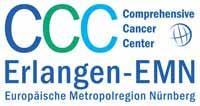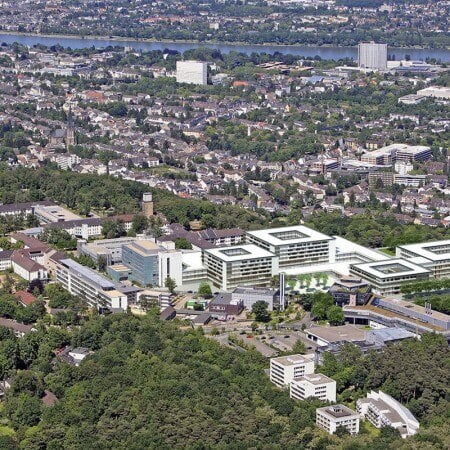Prostate Cancer With Metastases — Treatment of Bone Metastases With Radium-223 Dichloride (Xofigo®) in the Best Hospitals in the World
Treatment prices are regulated by national law of the corresponding countries, but can also include additional hospital coefficients. In order to receive the individual cost calculation, please send us the request and medical records.

Department of Nuclear Medicine
The Department of Nuclear Medicine offers the full range of diagnostic and therapeutic services in the area of its specialization. Of particular interest are PET/CT, PET/MRI, SPECT/CT, as well as innovative therapeutic methods of nuclear medicine, such as peptide radioreceptor therapy for neuroendocrine tumors, liver tumor radioembolization, and treatment of prostate cancer using radioligands to prostate-specific membrane antigen (PSMA therapy). The department's doctors most often admit patients suffering from cancers, diseases of the nervous and cardiovascular system. The patients receive medical care from the highly qualified internationally renowned specialists with profound clinical training and rich experience. The department's doctors use only reliable radioisotopes, which do not have a harmful effect on the human body and do not cause any side effects. The patients are admitted both on an inpatient and outpatient basis.






Department of Nuclear Medicine
The Department of Nuclear Medicine offers the full range of radioisotope diagnostics and treatment of various diseases. The department began its work in 1951 and today it is one of the leading and most reputable medical facilities of this kind in Germany. The clinical activities mainly focus on detection and treatment of pathologies of the thyroid gland, heart, lung cancer, breast cancer, prostate gland, liver cancer and metastases, neuroendocrine tumors, malignant melanoma, and brain tumors. The doctors use only reliable, the most effective innovative methods of examination and therapy, which guarantee an optimal result.







Department of Nuclear Medicine
According to the Focus magazine, the Department of Nuclear Medicine ranks among the best medical facilities of its kind in Germany! The department began its work in 1965, and therefore today it offers the full range of diagnostic and therapeutic services in the field of nuclear medicine. An experienced team of the department's doctors specializes in scintigraphy, PET-CT, radioiodine therapy, special types of radionuclide therapy for cancer, treatment of benign and malignant thyroid diseases. Of particular interest is radioisotope diagnostics of cardiovascular pathologies. The department has state-of-the-art equipment, thanks to which specialists in the field of nuclear medicine carry out accurate diagnostics and effective treatment. The focus of the department's medical team is on the patient and his individual needs. Doctors attach great importance to preventive radioisotope diagnostics, which can reliably reveal the slightest pathological changes at the molecular level.


Prostate oncology is one of the most alarming problems of modern oncourology. Despite the improvement of diagnostic methods, the incidence of disseminated prostate cancer with distant metastases remains high. In disseminated cancer, the greatest number of distant metastases are localized in lymph nodes and bones. Frequent localization of metastatic cells in bones is explained by the stimulation effect of the tumor cells on bone tissue.
Content
- About metastatic prostate cancer
- About therapy with Radium-223 dichloride (Xofigo)
- How Xofigo works?
- Indications for treatment with Radium-223 dichloride (Xofigo)
- How is therapy with Radium-223 dichloride (Xofigo) carried out?
- Are there any side effects of therapy with Radium-223 dichloride (Xofigo)?
- Where is the treatment with Xofigo available?
- Undergoing treatment with Radium-223 dichloride (Xofigo) with Booking Health
About metastatic prostate cancer
The mechanism of prostate cancer metastases is the ability of cancer cells to move from the tumor, localized directly in the prostate, throughout the body with blood and lymph. This occurs due to the formation of new blood vessels in the cancerous tumor that eventually sprout into the general bloodstream. Because this process takes time, metastases in most cases do not form until the advanced stages of cancer. Prostate cancer most often produces lung and bone metastases (especially the lumbar and thoracic spine, and pelvic bones).
Treatment of prostate cancer with bone metastases depends on the localization of the mass. In the majority of cases of bone metastases from prostate cancer, the patient is prescribed hormone therapy (less often chemotherapy if hormone therapy is ineffective). Hormone therapy is based on inhibiting tumor growth by slowing down the division of prostate cells with substances that inhibit hormone production. Radiation therapy may be carried out at the same time as hormone therapy.
At the advanced stages of prostate cancer, specialists sometimes tend to the wait-and-see tactics and the active surveillance tactics. This approach for the treatment is especially preferable for older men with comorbidities (that can lead to complications during treatment). Such patients should have regular examinations (including prostate ultrasound) and blood tests for PSA levels.
About therapy with Radium-223 dichloride (Xofigo)
One of the most frequent localizations of metastases in prostate cancer is bone tissue. Unfortunately, these metastases often cause pain syndrome and have an extremely negative impact on the quality of life of patients with prostate cancer. Various studies confirmed that the use of Radium-223 (Xofigo) in patients with metastatic prostate cancer with bone metastases increased overall survival, and also had a positive effect on pain syndrome.
Radionuclide treatment for bone metastases is used to increase patients' life expectancy. One of the best therapy options in terms of effectiveness and safety is therapy with Xofigo. Xofigo treatment works even in hormone-resistant prostate cancer or in patients who do not respond to chemotherapy. The therapy with Xofigo is well tolerated and rarely suppresses bone marrow function due to the minimal radiation length of the radioactive particles. Xofigo Radium dichloride, unlike many other drugs for radionuclide therapy, provides a high quality of life for patients, prevents complications, increases life expectancy, while minimizing radiation exposure to bone marrow.
Treatment of bone metastases with Xofigo is performed when cancer becomes resistant to hormone therapy. And until 10 years ago, chemotherapy and support with bone-modifying drugs were the only treatment option in such cases. In the 2010s, however, Germany and other developed countries began using radionuclide therapy for prostate cancer. And this is exactly the type of radiation therapy that allows the destruction of metastases in the bones.
How Xofigo works?
Xofigo is a radioactive isotope that decays through a chain of six short-lived isotopes to stable 207Pb (lead), releasing radiation. It is 95.3% alpha radiation, 3.6% beta radiation, and 1.1% gamma radiation. Radionuclide treatment of prostate cancer involves the use of not only Radium, but also other substances. The most important difference between this drug and other drugs is that it is less toxic. The patient is absolutely safe for others after the injection of Xofigo. After using many other drugs for systemic radiation therapy, the patient has to spend some time in observation. In the case of Xofigo, an additional stay in special conditions is not required; the person can safely go home. Radium-223 dichloride (Xofigo) has two key advantages that make the drug more effective and safer. The first one is that alpha radiation spreads only 0.1 mm from the place of accumulation, while for other radionuclides it can reach 5.5 mm; the second is that the energy emitted is tens of times higher.
The short length of radiation is especially important in the treatment of bone metastases, since the bone marrow, which produces blood cells, is located nearby. Myelotoxicity is the main problem with most radionuclides. But when using Radium-223 dichloride (Xofigo) severe suppression of hematopoiesis function occurs only in 15% of patients, because in the majority of patients radiation practically does not reach the bone marrow.
After intravenous administration, Radium-223 dichloride (Xofigo) interacts with the main mineral component of bone tissue. Therefore, the drug has a targeted effect on metastatic cells in the bones without affecting other organs.
The efficacy of Xofigo was confirmed in various studies, which detected the improvement of the overall health condition of patients and better life expectancy.
Xofigo is a drug of double action. First, it destroys signs of metastatic bone lesions, actually giving the opportunity to improve and prolong health and well-being of the patient on the background of the pathology. Such therapy shows a highly concentrated anti-tumor effect. Second, Xofigo treats the pain syndrome, which is very important.
Indications for treatment with Radium-223 dichloride (Xofigo)
There are three conditions for prescribing the Xofigo therapy such as hormonally inactive cancer, the appearance of the bone lesions, and the absence of the latter in internal organs. Most people with the fourth stage of oncology fall under this category, since 90% of them have metastatic lesions in the bone tissue.
Xofigo is not used for the treatment of patients with metastatic cells in the liver or lungs. But, generally, such cases are rare. Bone involvement is noted in more than 85% of patients with metastatic cancer.
However, Xofigo treatment has a few contraindications, two of them being early age and hypersensitivity to the active substance. In all other cases, the potential advantages outweigh the theoretical risks. However, the medicine is also applied with caution with impaired bone marrow function, kidneys, liver, chronic inflammatory bowel syndrome, and progressive diffuse tumor bone infiltration. Prior to treatment, all people are screened for possible contraindications.
How is therapy with Radium-223 dichloride (Xofigo) carried out?
The Radium-223 dichloride (Xofigo) is administered intravenously. Usually, the patient gets 6 injections, which are given once every 4 weeks. It is administered slowly, within 1 minute. The dose is calculated individually, taking into account the patient's body weight and the time from making the drug to administering it.
Radium-223 dichloride (Xofigo) quickly accumulates in the bones. Already 15 minutes after injection only 20% of the total dose remains in the blood. The isotope practically does not penetrate the heart, kidneys, bladder, liver, or spleen. Up to 5% of the drug is excreted with the urine, the rest – through the intestines.
Three-quarters of the drug leaves the body after 1 week. By the time of the next injection, which takes place after 4 weeks, most of the substance is radioactively decomposed.
Are there any side effects of therapy with Radium-223 dichloride (Xofigo)?
Despite the encouraging results in medicine, oncologists have had important questions about the toxicity of this treatment option, most notably concerns about myelotoxicity. Recently, the results of a long-term (more than 3-year long) study of patients treated with Xofigo have been published. During this follow-up period, no patients had new cases of acute myeloid leukemia, or new primary bone tumors. No other hematologic toxicity was detected.
Therapy with Xofigo generally does not imply an unpleasant experience. About 25% of patients experience no side effects at all. Most patients develop them, but they are limited to toxic reactions of 1-2 degrees. Severe side effects that require delaying or canceling the next dose of the drug occur in only 10% of patients.
In general, people feel better thanks to therapy. Xofigo not only helps curb the development of the disease for a long time, but also positively influences life quality.
Where is the treatment with Xofigo available?
The treatment with Radium-223 dichloride (Xofigo) is considered an innovative therapy in medicine and it is currently available in a limited number of hospitals. Most of these hospitals are located abroad, primarily in Germany and Austria.
The hospitals that provide therapy with Radium-223 dichloride (Xofigo) are listed below:
- University Hospital Erlangen, Germany
- University Hospital Bonn, Germany
- Hannover Medical School (MHH), Germany
- Central Clinic Bad Berka, Germany
- Minute Medical Vienna, Austria
In terms of prices, the cost of treatment in mentioned hospitals varies. The cost of treatment with Radium-223 Dichloride (Xofigo®) for prostate cancer with bone metastases is between 21,700 EUR and 23,600 EUR.
You can find more information about the hospitals to undergo therapy in and the cost of treatment at the Booking Health website.
Undergoing treatment with Radium-223 dichloride (Xofigo) with Booking Health
Organizing medical care abroad is a process that requires careful preparation and the participation of qualified specialists. When it comes to the treatment in countries with the most highly developed medical services, like Germany and Austria, you will need to establish contact with a suitable hospital, translate the necessary medical documents, plan the course of treatment and deal with organizational issues throughout your treatment, like booking flight tickets and accommodation, getting a medical visa, etc.
Booking Health is ready to help you organize the whole treatment with Radium-223 dichloride (Xofigo), starting from selecting the most suitable hospital for you up to supporting you until you safely get home. Booking Health provides you with options to choose from regarding specialized hospitals and programs that can be personalized so that they would suit your needs.
If you want to start your treatment with Radium-223 dichloride (Xofigo), fill in the request form on the Booking Health website, and our medical advisors will contact you as soon as possible.
Authors: Dr. Nadezhda Ivanisova, Dr. Sergey Pashchenko

